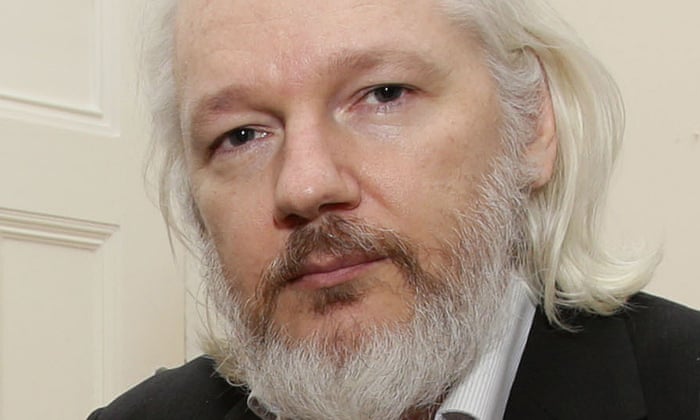WikiLeaks founder says he told the NSA whistleblower he could be kidnapped or killed, and that he was better off sheltering in Russia despite ‘negative PR’

Julian Assange also accused US officials of breaking the law in their pursuit of him and his whistleblowing organisation. Photograph: Yui Mok/PA
Julian Assange has said he advised the NSA whistleblower Edward Snowdenagainst seeking asylum in Latin America because he could have been kidnapped and possibly killed there.
The WikiLeaks editor-in-chief said he told Snowden to ignore concerns about the “negative PR consequences” of sheltering in Russia because it was one of the few places in the world where the CIA’s influence did not reach.
In a wide-ranging interview with the Times, Assange also said he feared he would be assassinated if he was ever able to leave the Ecuadorian embassy in London, where he sought asylum in 2012 to avoid extradition.
He accused US officials of breaking the law in their pursuit of him and his whistleblowing organisation, and in subjecting his connections to a campaign of harassment.
WikiLeaks was intimately involved in the operation to help Snowden evade the US authorities in 2013 after he leaked his cache of intelligence documents to Glenn Greenwald, then a journalist with the Guardian.
Assange sent one of his most senior staff members, Sarah Harrison, to be at Snowden’s side in Hong Kong, and helped to engineer his escape to Russia – despite his discomfort with the idea of fleeing to one of the US’s most powerful enemies.
“Snowden was well aware of the spin that would be put on it if he took asylum in Russia,” Assange told the Times.
Julian Assange has said he advised the NSA whistleblower Edward Snowdenagainst seeking asylum in Latin America because he could have been kidnapped and possibly killed there.
The WikiLeaks editor-in-chief said he told Snowden to ignore concerns about the “negative PR consequences” of sheltering in Russia because it was one of the few places in the world where the CIA’s influence did not reach.
In a wide-ranging interview with the Times, Assange also said he feared he would be assassinated if he was ever able to leave the Ecuadorian embassy in London, where he sought asylum in 2012 to avoid extradition.
He accused US officials of breaking the law in their pursuit of him and his whistleblowing organisation, and in subjecting his connections to a campaign of harassment.
WikiLeaks was intimately involved in the operation to help Snowden evade the US authorities in 2013 after he leaked his cache of intelligence documents to Glenn Greenwald, then a journalist with the Guardian.
Assange sent one of his most senior staff members, Sarah Harrison, to be at Snowden’s side in Hong Kong, and helped to engineer his escape to Russia – despite his discomfort with the idea of fleeing to one of the US’s most powerful enemies.
“Snowden was well aware of the spin that would be put on it if he took asylum in Russia,” Assange told the Times.
“He preferred Latin America, but my advice was that he should take asylum in Russia despite the negative PR consequences, because my assessment is that he had a significant risk he could be kidnapped from Latin America on CIA orders. Kidnapped or possibly killed.”
However, Assange’s story appears to be at odds with reports from the time, which detail a plan hatched to whisk Snowden from Russia, where he was stuck in the transit area of Moscow’s Sheremetyevo airport after his US passport was revoked, and into political asylum in Ecuador.
In a statement issued as the drama unfolded, WikiLeaks said of Snowden: “He is bound for the republic of Ecuador via a safe route for the purposes of asylum, and is being escorted by diplomats and legal advisers from WikiLeaks.”
But the plan unravelled after Ecuador’s president, Rafael Correa, declared invalid a temporary travel document issued by his London consul – in collaboration with Assange – after other Ecuadorean diplomats said in leaked correspondence that the Wikileaks founder could be perceived as “running the show”.
Correa went on to criticise the consul, Fidel Narvaez, telling the Associated Press that to have issued the document – which was thought to have been used by Snowden to travel from Hong Kong to Moscow – without consulting Quito was a serious error.
In his Times interview, Assange also outlined his own fears of being targeted. He said that even venturing out on to the balcony of Ecuador’s embassy in Knightsbridge posed security risks in the light of bomb and assassination threats by what he called “unstable people”.
He said he thought it was unlikely he would be shot, but that he worried that if he was freed he could be kidnapped by the CIA.
“I’m a white guy,” Assange said. “Unless I convert to Islam it’s not that likely that I’ll be droned, but we have seen things creeping towards that.”
Ecuador granted the Australian political asylum in 2012 under the 1951 refugee convention.
He believed he risked extradition to the US from the UK and Sweden, where he is under investigation for his involvement with WikiLeaks. He also faces extradition to Sweden for an investigation into an alleged rape.
He has remained in the embassy for nearly three years, with a round-the-clock police guard thought to have cost more than £11m. Assange believes his situation will be resolved in the next two years.


No comments:
Post a Comment